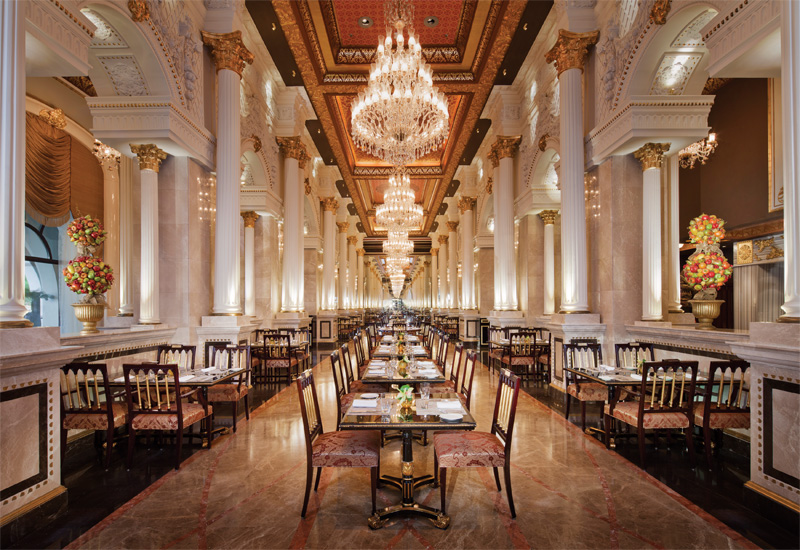 The interiors of Imperium at the Jumeirah Zabeel Saray in Dubai; it is known for its classical French fare and has items like oysters on its Friday brunch.
The interiors of Imperium at the Jumeirah Zabeel Saray in Dubai; it is known for its classical French fare and has items like oysters on its Friday brunch.
Meet the Experts
- Daniel Hoefler, chef de cuisine, Traiteur, Park Hyatt Dubai
- François-Xavier Simon, outlet chef, Choix and Reflets Par Pierre Gagnaire, InterCon DFC
- Izu Ani, head chef, La Serre Dubai
- Neil Foster, executive chef, Jumeirah Zabeel Saray
- Stuart Collins, executive chef, Qatar Luxury Group
Caterer Middle East investigates the authenticity of French cuisine in the region, chefs’ biggest challenges, and what the latest trends are
Would you say French cuisine is popular in this region?
Daniel Hoefler, chef de cuisine, Traiteur, Park Hyatt Dubai: French food is all about passion and culture, which is highly appreciated here. France has an incredible diversity when it comes to ingredients; every region is so unique and there is so much for chefs to choose from. People travelling to, and living in, Dubai associate this food with fine dining but the restaurant scene has proven there is so much more to it.

| Advertisement |
François-Xavier Simon, outlet chef, Choix and Reflets Par Pierre Gagnaire: It has taken its prime place in Dubai within the multi-cultural audience, especially with the growing French community. This is based on the latest stats shared by the French Consulate stating that we have a minimum of one French family that visits Dubai every day.
Izu Ani, head chef, La Serre Dubai: After getting some negative press for being very heavy and using lots of butter, the French style of cooking is becoming more and more popular again. I think the Southern French cuisine is particularly well suited to Dubai because of the warm climate.
Stuart Collins, executive chef, Qatar Luxury Group: Yes. There are many expatriates in the Middle East who are looking for a taste of home, but also a great appreciation for the cuisine by many others.
Are recipes tweaked to suit a local audience?
DH: We stick to simple preparations using French techniques; we don’t want to overcomplicate our dishes and I cannot say that we try to adjust to a local palate.
FS: We do have a traditional French kitchen and follow all the French basics of cooking, however we are inspired by quality products from different parts of the world and alternative ways of cooking.
IA: An intelligent chef always adapts to their local environment. In my experience, if you don’t, then things don’t tend to last too long. However, we try to stay authentic as much as possible and true to the original concept, in the dishes that we serve and the style of cooking. One example of a dish that has been tweaked is the tarte flambée. In France it is served with lardons but we’ve adapted it with cherry tomatoes instead. Funnily enough, despite changing one of the key ingredients this is one of our most popular dishes.
Neil Foster, executive chef, Jumeirah Zabeel Saray: The recipes are as authentic as they can be. The depth of training needed within classic French techniques/cooking can often be adapted within a team, particularly when working with different nationalities so there are always slight variations.
SC: The biggest difference is not using alcohol in the recipes. Many French dishes call for it, but we choose to work without to ensure our menu is available to all. We also take inspiration from the local cuisine and incorporate elements of it into our menu where possible.
Article continues on next page ...








 Search our database of more than 2,700 industry companies
Search our database of more than 2,700 industry companies









